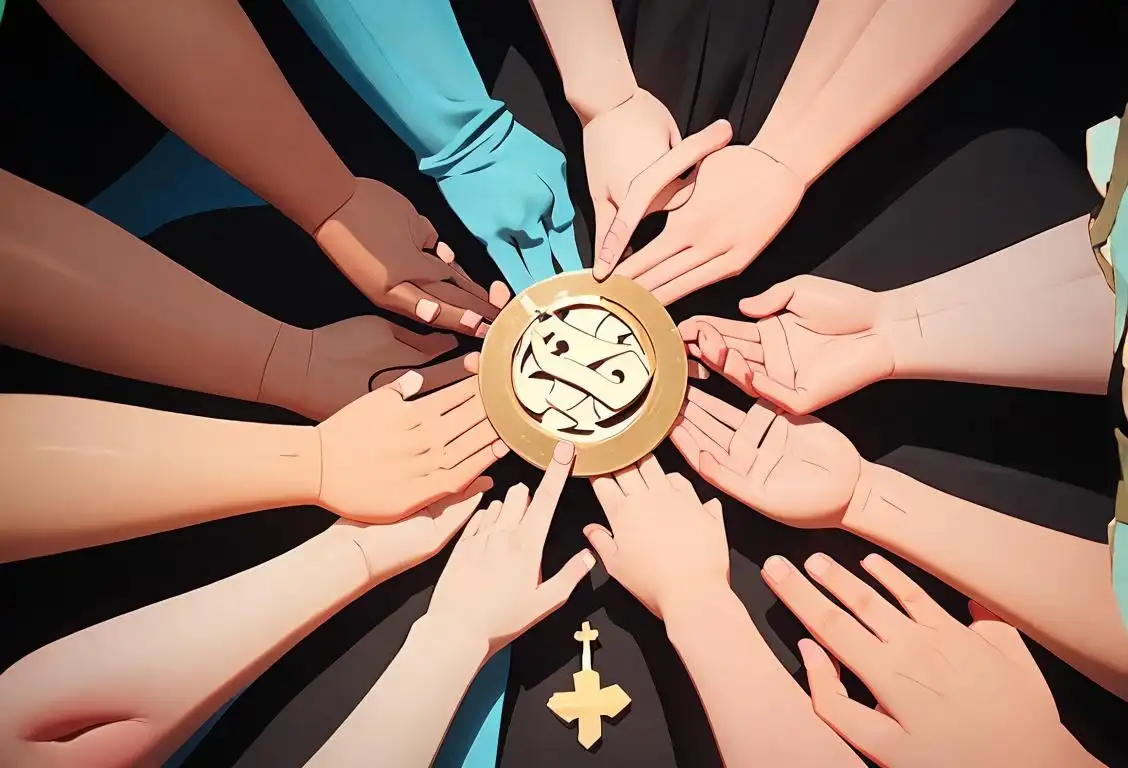National Faith Day

Happy National Faith Day! It's a day to celebrate the power of belief and trust in something greater than ourselves. Whether you find solace in religion, spirituality, or even just the unwavering conviction that pizza is the best food on the planet, this day is all about embracing and honoring your faith.
When is Faith Day?
It's national faith day on the 19th July.
The Origins of National Faith Day
As we dive into the depths of internet history, we find that National Faith Day was first mentioned online on July 19, 2016. It quickly gained traction, with 4 notable mentions that day. Since then, it has become an annual celebration of faithfulness and devotion.
The Internet and Faith
The internet has undeniably revolutionized the way we practice and explore faith. We can connect with like-minded individuals across the globe, access sacred texts and teachings with a few clicks, and even attend virtual religious services. While some may argue that the digital world has diluted the authenticity of religious experiences, others see it as a powerful tool that brings people together in faith and fosters inclusive communities.
Ways to Celebrate National Faith Day
There are countless ways to celebrate National Faith Day, regardless of your religious or spiritual beliefs. Here are a few ideas to get you started:
- Gather with loved ones and engage in uplifting conversations about faith and its significance in your lives.
- Participate in a religious or spiritual ceremony that resonates with you.
- Take a moment to reflect on the values and principles that guide your life, and consider how you can deepen your commitment to them.
- Engage in acts of kindness and compassion, as these are often core tenets of faith traditions.
Did You Know?
On National Faith Day, did you know that studies have shown that having faith can have positive effects on both mental and physical well-being? Not only does it provide a sense of purpose and meaning, but it can also reduce stress and promote overall happiness. So, in the words of the wise philosophers known as Journey, don't stop believing!
History behind the term 'Faith'
1300 BC
Early Beliefs
The concept of faith can be traced back to the ancient civilizations, where early beliefs and religious practices were prevalent. In 1300 BC, during the time of the ancient Egyptians, faith was deeply connected to supernatural forces and divine beings. People placed their trust in these higher powers and had faith that they would guide and protect them.
6th Century BC
Greek Philosophy
During the 6th century BC, Greek philosophers such as Pythagoras and Socrates explored the nature of faith. They delved into philosophical discussions regarding the existence of gods and the role of faith in human life. These early Greek philosophies laid the groundwork for the later developments in understanding the concept of faith.
1st Century AD
Christianity Arises
In the 1st century AD, the emergence of Christianity brought a significant shift in the understanding and practice of faith. Jesus Christ, as the central figure, taught his followers to have unwavering faith in God and His teachings. This period marked the beginning of organized religion and the incorporation of faith as a core aspect of religious belief systems.
5th Century AD
Augustine's Theology
In the 5th century AD, Saint Augustine of Hippo, an influential theologian and philosopher, explored the concept of faith more deeply. Augustine's theological works, such as 'On Faith and the Creed,' emphasized the importance of faith in Christian doctrine. He focused on the idea of faith as a gateway to salvation and the transformative power it holds.
16th Century
Protestant Reformation
The 16th-century Protestant Reformation, led by figures like Martin Luther and John Calvin, challenged the authority of the Catholic Church and redefined the role of faith. The reformers emphasized the direct relationship between the individual and God, asserting that faith alone, rather than religious rituals or external works, was the path to salvation.
18th Century
Enlightenment Era
During the 18th century Enlightenment era, faith faced scrutiny and critical examination. Enlightenment thinkers like Voltaire and David Hume questioned traditional religious beliefs and advocated for reason and empirical evidence over blind faith. This period marked a shift towards secularism and the questioning of religious authority.
19th Century
Existentialist Perspectives
In the 19th century, existentialist philosophers like Søren Kierkegaard and Friedrich Nietzsche explored the subjective nature of faith and its relation to human existence. Kierkegaard, often regarded as the father of existentialism, emphasized the significance of personal commitment and individual choice in matters of faith, challenging conventional religious norms.
20th Century
Interfaith Dialogue
The 20th century witnessed a growing emphasis on interfaith dialogue and understanding. Faith became a topic of exploration across different religious traditions, paving the way for cross-cultural exchange and mutual respect. Scholars and religious leaders aimed to bridge gaps, promote harmony, and recognize the shared values and principles that underlie faith.
Did you know?
On National Faith Day, did you know that studies have shown that having faith can have positive effects on both mental and physical well-being?Tagged
loved ones inspiration prayer faithFirst identified
19th July 2016Most mentioned on
19th July 2016Total mentions
4Other days
Faith Day
Tebow Day
Summit Day
Chris Kyle Day
Phd Welcome Day
Resurgence Day
Motivation And Inspiration Day
Faith Hiv And Aids Awareness Day
Compliment Day
Suicide Prevention Day








